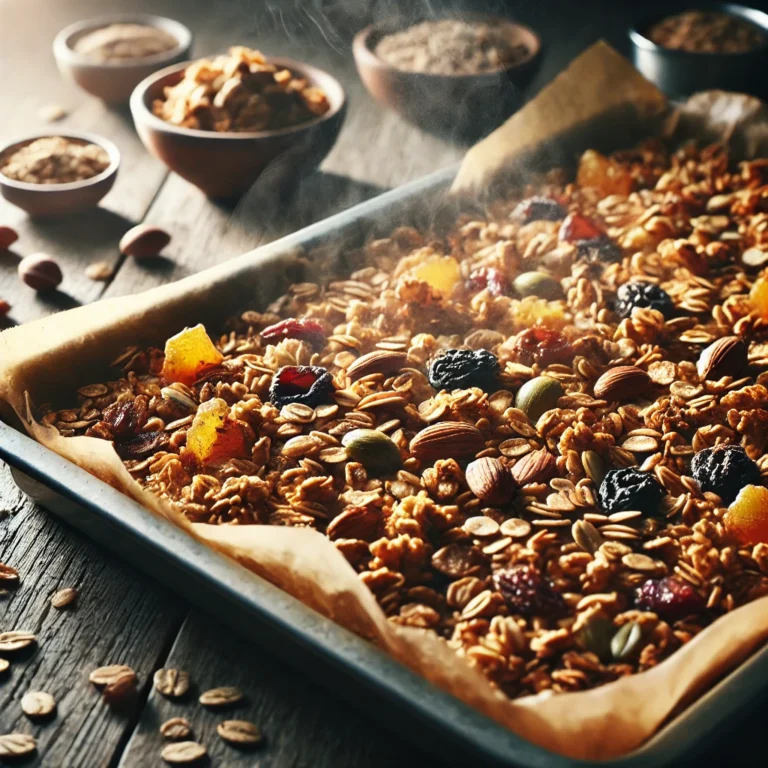*This post may contain affiliate links for which I earn commissions.*
I’ve often come across the notion that if you want to lose weight, you should start by skipping meals. It seems straightforward enough: fewer meals should equal fewer calories, and therefore, weight loss should naturally follow. I wrote this article to look into this widespread belief and provide a clearer understanding of whether skipping meals really does help in shedding those extra pounds. The theory behind it is obvious if you
The goal here isn’t just to debunk a myth for the sake of it; it’s to ensure you’re equipped with the right information to make healthy and effective choices about your diet. I know there’s a sea of advice out there, some good and some not so much. That’s why I believe in grounding our discussion in solid research and tapping into what experts in the field have to say.
What’s at stake is not just the number on the scale, but a deeper question: Are we nurturing our bodies the right way? It’s critical we hinge our decisions on well-researched information. Through this piece, I intend to provide such guidance, clear out the fog of misconceptions, and ultimately support you in making well-informed dietary choices that align with your health goals.

Understanding the Basics of Weight Loss
Weight loss seems simple in theory: consume fewer calories than your body burns, and you’ll shed pounds. Behind this simple equation is the concept of ‘calories in vs. calories out.’ Essentially, if you eat less than your body requires for energy, it turns to stored fat for fuel, leading to weight loss.
However, this is just the tip of the iceberg. The body is a complex machine that requires energy, derived from calories, to perform its daily functions – from breathing to walking to carrying out cellular repairs. When you consume food, these calories are either immediately used for energy or stored in the body as fat, a reserve for times when food is scarce.
Your metabolism, which is the process your body uses to convert what you eat and drink into energy, plays a pivotal role in this balance. It’s affected by several factors, including your genetic makeup, age, gender, body composition, and level of physical activity. A faster metabolism will burn calories more quickly, which can contribute to weight loss. Conversely, a slower metabolism won’t require as much energy, meaning fewer calories are burned throughout the day.
It’s crucial to understand that all of these components must work together harmoniously for successful weight management. Cutting down too drastically on calories often does more harm than good, as it can disrupt this delicate balance and trigger a host of other health issues, such as low energy levels and poor nutrition.
Armed with this baseline knowledge, it becomes evident that skipping meals may not be the golden ticket to weight loss it’s deemed to be. I invite you to keep reading as I delve into the psychology behind meal skipping and the potential impact it can have on your body and mind.
There are three things I commit to on a daily basis: Exercising for an hour a day, tops. Never skipping meals. And accepting the size and shape I was born with.
Paula Abdul
The Psychology Behind Meal Skipping
You might have noticed a tricky thing about eating habits: they’re not just about hunger. Skipping meals is often more psychological than physiological. I’ve found that my own decisions about when to eat can be heavily influenced by how I’m feeling or the day’s events.
Stress, for example, can play a huge role. It’s not uncommon for someone to skip meals when under a lot of pressure due to decreased appetite or simply forgetting to eat. Yet, this act, intended to cope with immediate stress, can create a cycle of erratic eating patterns that mess with your body’s ‘hunger clock.’


Skipping a meal here and there might not seem like a big deal, but repeat this routine enough, and you could stumble into the realm of disordered eating. Subconsciously, meal skipping might even become your default response to stress or a busy schedule, setting a troubling precedent for your relationship with food. Skipping your meals may spark trigger eating.
It’s also worth noting that how you perceive food and its role in your life shifts when you start skipping regularly. Instead of seeing meals as pleasurable and nourishing, they might undesirably morph into nothing more than a time-consuming necessity or, worse, an enemy in your weight loss journey.
Understanding these psychological aspects is crucial, it’s the bridge to the next topic: metabolism. Skipping meals impacts more than just our mental and emotional state; it has biological consequences as well. I’ll talk about how dabbling with meal times can unintentionally put your metabolism on the back foot – and that’s not ideal for anyone looking to shed weight.
Meal Skipping and Metabolism – Neither friends nor allies.
You may have heard urging voices claiming skipping meals cuts calories, thereby driving weight loss. It seems logical, right?
Yet, this is where the body proves more complex than simple arithmetic. Metabolism, the engine of your body’s calorie-burning, isn’t constant; it adapts to your eating patterns. When you skip meals regularly, your body might perceive a scarcity of food. Responding to this, it conserves energy, which means your metabolism slows down.
This survival mechanism kicks in because your body is designed for longevity, not to fit into a particular jean size. Consequently, with a slower metabolism, not only do you burn fewer calories during rest, but your energy levels and nutritional balance may suffer too.
So, when you eat less frequently, your body may cling to the next meal, storing more energy as fat. Over time, this erratic eating can contribute to weight gain, ironically contradicting the initial goal of weight loss through meal skipping.
It’s also important to acknowledge that everyone’s metabolism is unique. Factors like genetics, age, and activity levels play significant roles. But one common thread is clear: sustaining a regular eating schedule tends to support a healthier metabolism.
As I transition into the next section about nutrient deficiencies, remember this essential takeaway: A healthy metabolism relies on consistent fueling. It isn’t just about losing weight; it’s about nurturing your body to function optimally.
Nutrient Deficiency: The Silent Threat
You may have heard the phrase ‘You are what you eat,’ which underscores the critical role nutrition plays in maintaining our health. When someone decides to skip meals regularly, it’s not just calories they’re missing out on, but a spectrum of nutrients that are vital for the body’s systems to function optimally.
Each meal is an opportunity to nourish your body with vitamins, minerals, proteins, fats, and carbohydrates. By missing these chances, there could be an unintended entry ticket to deficiencies that pose their own pressing issues. For instance, insufficient iron can lead to anemia, too little calcium might weaken your bones, and a lack of enough vitamin C can impair your ability to repair tissues and fend off infections.
It’s important to recognize that getting a wide variety of nutrients is not just about sidestepping deficiencies; it also has a significant effect on your weight management efforts. A body well-fed with the right nutrients is like a well-oiled machine, capable of functioning at its best, including managing its weight.
In the following section, ‘Debunking the Myth with Clinical Evidence,’ I’ll help you connect these dots clearly. The evidence we’ll explore doesn’t just suggest, but firmly establishes that skipping meals might not only make weight management harder but could actively contribute to weight gain. This might seem paradoxical, but science often reveals truths that run counter to intuition.
Debunking the Myth with Clinical Evidence
I see this quite often: people cling to the idea that fewer meals will naturally lead to weight loss, but is this based on science? Spoiler alert: extensive research contradicts this myth.
Several studies have zeroed in on the impact of meal frequency, especially skipping breakfast, on weight control. One significant body of work by Giovannini et al., 2010, observed two groups of individuals – one that ate breakfast regularly and another that didn’t. The findings suggested no direct correlation between skipping breakfast and shedding pounds. In fact, missing the first meal of the day didn’t accelerate weight loss and sometimes even led to increased consumption later in the day.
Expert nutritionists and dietitians reinforce this point, emphasizing that skipping meals can trigger overeating. The logic is simple – when you skip meals, you’re more likely to feel ravenous and less in control of your food choices later on. Instead of thoughtful, nourishing meals, you end up grabbing whatever is fastest, which often isn’t the healthiest option.
Coming up next, I’ll share some practical alternatives to meal skipping that are not only sustainable but also support your overall health. It’s all about finding balance and making smart, informed choices that benefit your body in the long haul.
Healthy Alternatives to Skipping Meals
You understand the appeal. Cutting out a meal here and there seems like a straightforward path to reducing calorie intake. But, as you’ve seen, the reality is far more complex, and the effects of meal skipping can be counterproductive. It’s time to replace myth with strategy.
The truth is, you don’t have to skip meals to manage your weight effectively. Consider the alternative of eating smaller, more frequent meals throughout the day. This approach can help keep your metabolism humming along and prevent the intense hunger that often leads to overeating.
Portion control is key in this strategy. By controlling the size of your meals, you can enjoy a variety of foods without the risk of consuming too many calories. A sensible portion is about the size of your fist or palm — a guideline that’s easy to visualize when you’re dishing up your plate.
Don’t overlook the value of incorporating nutrient-dense snacks either. Snacks aren’t the enemy of weight loss; it’s the type of snack that matters. Choose items like fresh fruit, vegetables with hummus, or a handful of nuts — snacks that provide energy and help you feel full until your next meal.
Now, how does this strategy seamlessly merge into your lifestyle? That’s where some planning comes in. By preparing meals and snacks in advance, you won’t find yourself stranded without options — a scenario that can lead to poor dietary choices.
Lifestyle Adjustments to Support Weight Loss
It’s not just about what you eat, but also how you live. The right lifestyle choices can significantly boost your efforts to shed those extra pounds.
One pivotal factor is consistent physical activity. Exercise burns calories and builds muscle, which in turn can increase your resting metabolic rate. That means you burn more calories even when you’re not moving.
You don’t need to run marathons or lift heavy weights to make a difference. Regular brisk walks, cycling, swimming, or any activity that gets your heart rate up will do the trick. Aim for at least 150 minutes of moderate aerobic activity or 75 minutes of vigorous activity each week, as recommended by health authorities.
Quality sleep is another cornerstone of weight loss. A lack of sleep can disrupt hormones that regulate appetite, leading you to consume more calories. Try to get 7-9 hours of uninterrupted sleep each night to support your weight loss goals.
Lastly, never underestimate the impact of stress on your body. High stress levels can lead to emotional eating and weight gain. Incorporate stress-reducing activities like yoga, meditation, or simply deep-breathing exercises into your daily routine.
With these lifestyle adjustments, you’re not just losing weight, but also adopting healthy habits that can provide lasting benefits. As you adjust your routines, be patient and kind to yourself; change takes time.
The takeaway message is simple: Listen to your body and nourish it appropriately. If weight loss is your goal, consider approaches backed by scientific evidence that promote a healthy metabolism, nutritional completeness, and psychological well-being.
If you’re unsure about how to manage your dietary habits or if you’re considering making significant changes to your eating patterns, it’s a good idea to seek professional guidance. A dietitian or a healthcare specialist can help design a plan that’s tailored to your specific needs, ensuring that your journey towards better health is both effective and safe.
Conclusion: To Skipping Meals Helps You Lose Weight
I hope this discussion has helped clarify the truth behind the meal-skipping myth. It’s clear that while it may seem like a quick path to weight loss, regularly skipping meals can have counterproductive and even harmful effects on your body. Sustainable weight management is about consistency and balance. It involves making informed choices about what and when you eat and integrating these choices seamlessly into your lifestyle. Rapid weight loss methods, which often include skipping meals, rarely have lasting results and can lead to negative health outcomes.






